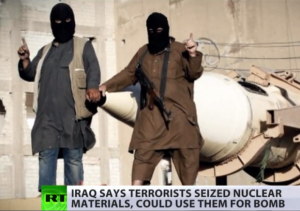Iraqi-led forces, backed by the United States military, have reportedly pushed the Islamic State (ISIS/ISIL) out of its strategic base in northern Iraq’s Mosul University complex
Mosul University once served as the jihadist group’s headquarters, makeshift chemical weapons factory, training facility, and killing ground.
Citing the United Nations, the Telegraph reports “radioactive materials” have been found in the university along with chemical agents used to make weapons, like reported by breitbart.com .
The Telegraph explains that ISIS jihadists had transformed a dormitory into a “makeshift chemical weapons factory” after taking agents from chemical stores in the College of Sciences.
“Soldiers were unable to enter and specialist engineers had been called in to neutralize any potential dangers posed by the chemicals,” adds the news outlet.
Mosul University has been described as formerly one of the largest higher education centers in the Middle East.
The Telegraph notes:
Iraqi special forces struck a devastating blow at the weekend to the jihadists, who were using the campus to stage a “final stand” in the east of Mosul, [ISIS’s] last stronghold in Iraq.
After entering the complex early on Friday, troops faced stiff resistance in the form of sniper and mortar fire and more than a dozen car bombs. More than 40 [ISIS] militants were killed and a dozen captured in fierce fighting.
“This was the toughest resistance we had seen so far in Mosul, they were everywhere,” declared Rasous Sabagh, identified by the British news outlet as one of the first soldiers to enter Mosul University.
However, the Iraqi private added, “By Saturday they [ISIS] were panicking, they were scared and some of them had even started to run away.”
Reuters learned from a spokesman for Iraq’s Counter-Terrorism Service (CTS) that the allied forces had “swept through the campus of Mosul University on Sunday to clear it of any remaining Islamic State militants after taking full control of the area.”
“The university is completely liberated and forces are sweeping the complex for any hiding militants,” CTS spokesman Sabah al-Numan told Reuters. “Most buildings are booby-trapped so we’re being cautious.”
The ongoing offensive to retake the city of Mosul — led by a U.S.-backed coalition of an estimated 100,000 fighters made up primarily of Iraqi security forces, Kurdish Peshmerga troops, and Iran-allied Shiite militias — has been raging since October.
Citing Lt. Gen. Abdul Wahab al-Saadi of the Iraqi counterterrorism forces, CNN notes that the U.S.-backed forces participating in the operation have also seized parts of the east bank of the Tigris River, which bisects Mosul from north to south.
Taking the eastern bank of the river will allow U.S.-backed Iraqi forces and their allies to begin efforts to take the western part of the city which is still controlled by ISIS.
“The latest phase in the bid to retake Mosul has advanced more quickly than expected… The new government complex in eastern Mosul as well as several Mosul University buildings had at one time been a headquarters and killing ground for ISIS fighters,” points out CNN.
CTS Spokesman al-Numan reportedly indicated that Iraqi security forces discovered “large amounts of suspected chemical substances and ‘a bomb factory’ at the university.”
Moreover, Iraqi federal police, which recently joined the U.S.-backed coalition fighting to seize back Mosul, noted Saturday, that intelligence information led them to uncover a facility used to make chemical weapons in al-Bir, about 27 miles south of Mosul.
ISIS has used chemical weapons in the past against the U.S. military, Iraqi forces, and their allies.
Losing Mosul, Iraq’ssecond-largestt city and the last remaining major ISIS stronghold in the country, could mean bring the end of the jihadist group’s presence in Iraq.



